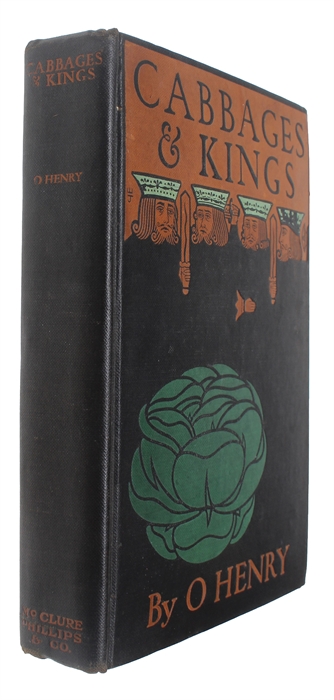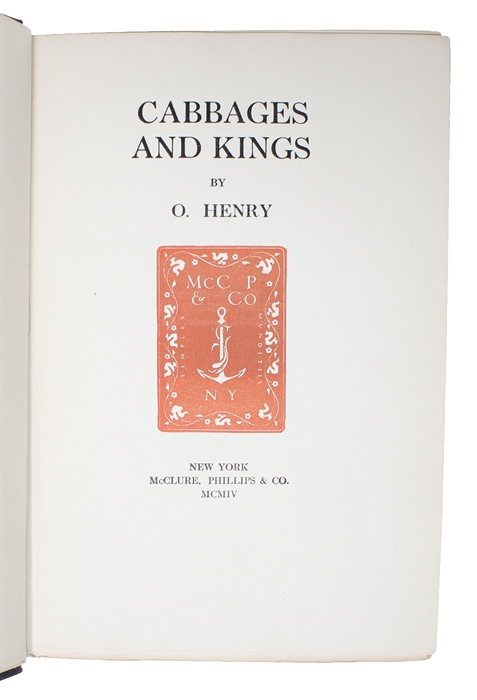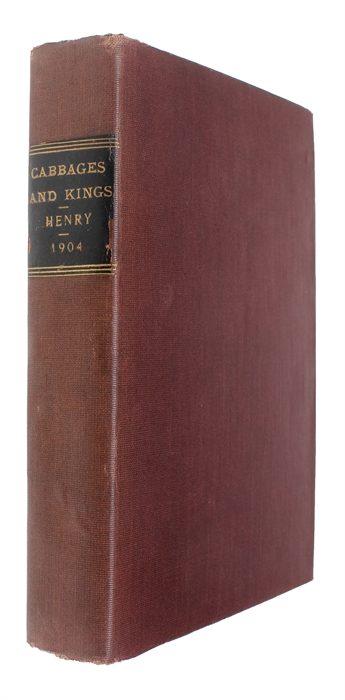COINING THE TERM "BANANA REPUBLIC"
HENRY, O. (psud. for WILLIAM SIDNEY PORTER).
Cabbages and Kings.
New York, McClure, Phillips & Co, 1904.
Original pictorial full cloth in red, green and black, depiCting kings and a cabbage head on the front board. Binding with minor wear to extremities. With a red cloth dust-jacket with gilt green title-label (original?). Dust-jacket with a bit of wear to capitals and corners and its title-label with very minor loss, far from affecting lettering. With the large book-plate of Darryl Zanuck (laid in loose).
First edition, first issue ("Mc Clure/ Philips/ & co" to bottom of spine) - with an excellent provenance - of this classic work, which coined the term "banana republic", a term that came to greatly influence our view of Latin America and which is now used in everyday vocabulary throughout the Western world.
"Violent, poor and politically wobbly, Honduras meets most people's definition of banana republic... Its murder rate is the highest in the world; its economy in a pickle. Its problems are not new: the turbulent country has the dubious honour of being the place that first inspired the description "banana republic" more than a century ago... It was coined in a 1904 book of fiction by O. Henry, an American writer. Henry (whose real name was William Sydney Porter) was on the run from Texan authorities, who had charged him with embezzlement. He fled first to New Orleans and then to Honduras where, staying in a cheap hotel, he wrote "Cabbages and Kings", a collection of short stories. One, "The Admiral", was set in the fictional land of Anchuria, a "small, maritime banana republic". It is clear that the steamy, dysfunctional Latin republic he described is based on Honduras, his jungle hideaway. Henry eventually returned to the United States, where he spent time in prison before publishing his short stories and then hitting the bottle, leading to an early death. (T.W. in The Economist, Nov. 2013).
O. Henry's phrase is appropriate in all senses of the expression. First, of course, it conjures up the image of a tropical, agrarian country. But more importantly, it refers to the influence of the American fruit companies of the period, which came to exercise an enormous influence over the countries in the region.
In the early twentieth century, the United Fruit Company, a multinational American corporation, was instrumental to the creation of the banana republic as an economic and political phenomenon of geopolitics. Together with other American corporations - with occasional political, diplomatic, and military support from the U.S. government - the corporations created the political, economic, and social circumstances that established a banana-republic culture for the colonial exploitation of Central American countries such as Honduras and Guatemala. Thus, as the meaning of "banana republic" generally describes a politically unstable country in Latin America, dependent on the exportation of a limited-resource product, like bananas, it could also be defined as "a country in which foreign enterprises push the government around" (The Economist).
The term "babana republic" is not only used as part of a general vocabulary, it is also used specifically in political science and in economic science.
_________________________
Darryl Francis Zanuck (1902 - 1979) was an American film producer and studio executive; he earlier contributed stories for films starting in the silent era. He played a major part in the Hollywood studio system as one of its longest survivors.
"Darryl F. Zanuck was undoubtedly one of the most remarkable men ever to become a Hollywood mogul. " (IMDb)
Order-nr.: 54129



